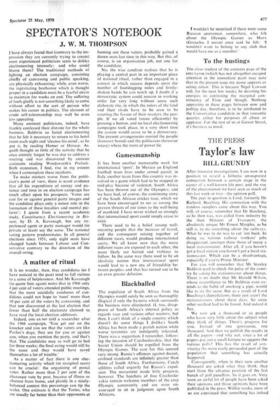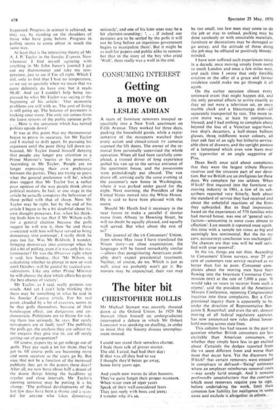THE PRESS
Taylor's law
BILL GRUNDY
After intensive investigations, I am now in a position to reveal a hitherto unsuspected connection between a certain stage in the career of a well-known life peer, and the rise of the phenomenon we have seen so much of this last week or two—the opinion poll.
The peer in question is Lord, formerly Dr Richard, Beeching. His connection with the
random samplers came about this way. You will, of course, remember that Dr Beeching, as he then was, was called from industry by
the then Minister of Transport, the absolutely unique Mr Ernest Marples, as he still is, to do something about the railways. What he was to do was to cut 'em back. In
doing so, various railway workers' jobs disappeared, amongst them those of many a local stationmaster. After all, if you haven't got a local station you haven't got a local sta- tionmaster. Which can be a disadvantage, especially if you're Prime Minister.
For you will remember that Mr Stanley Baldwin used to check the pulse of the coun- try by asking his stationmaster about things.
There is no doubt that Mr Harold Wilson, whose resemblance to Mr Baldwin even ex- tends to the habit of smoking a pipe, would like to do the same. But as a result of Lord Beeching's depredations, there just aren't the stationmasters about these days. So some other method had to be found. And indeed it has.
We now ask a thousand or so people who know very little about the subject what they think of things. There's progress for you. Instead of one ignoramus, one thousand. And then we publish the results in all the papers —and why not, since a lot of papers pay out a small fortune to support the various polls? This has the result of con- vincing the more easily persuaded part of the population that something has actually happened.
Consequently, when in their turn another thousand are asked what they think, they start from the advance position of the last bunch of poll panellists. So it goes on. Very soon an awful lot of people have been asked their opinions and those opinions have been published in the press. Within weeks, most of us are convinced that something has indeed
happened. Progress in science is achieved, so they say, by standing on the shoulders of those who have gone before. Progress in polling seems to come about in much the same way.
At least that is the interesting theory of Mr A. J. P. Taylor in the Sunday Express. Now whenever I find myself agreeing with anything in Mr John Junor's journal I get out my thermometer and take my tem- perature, just to see if I'm all right. Which I did, only to find that I had no temperature, as we say so quaintly when we mean that we quite definitely do have one, but it reads 98.4F. And yet I couldn't help being im- pressed by what Mr Taylor was saying at the beginning of his article: 'Our economic problems are still with us. The cost of living is still going up. The balance of payments is rocking once more. The only stir comes from the latest returns of the public opinion polls . . . Here is the sensation which has turned politics upside down'.
It was at this point that my thermometer began to prove its accuracy, for Mr Taylor and I started to drift apart. In pursuing his argument until the poor thing fell down ex- hausted, Mr Taylor found himself denying that people any longer pay attention to a Prime Minister's 'merits or his promises'. According to Mr Taylor, 'People are no longer expressing their own preference between the parties. They are trying to guess what the general preference will be', which does suggest that Mr Taylor has a rather poor opinion of the way people think about political matters. In fact, at one stage in the article he actually compares the behaviour of those polled with that of sheep. Now Mr Taylor may be right, but by the end of his article I began to be a bit doubtful about his own thought processes. For, when his think- ing leads him to say that if Mr Wilson calls for a general election because the polls suggest he will win it, then 'he and those associated with him will have served to bring democracy into contempt', I really think he goes too far. Was Mr Baldwin, I wonder, bringing democracy into contempt when he did a bit of polling, even if it was only his sta- tionmaster? Or was the Observer right when it said, last Sunday, that 'Mr Wilson, in calculating whether to plunge in now or wait until October, will be guided by tactical con- siderations. Like any other Prime Minister he will choose the date which offers his party the best chance of victory'.
Mr Taylor, as I said, really protests too much. And yet I can't help thinking that there may be something in what he said in his Sunday Express article. For his real point, clouded by a lot of excesses, seems to be that polls themselves, because of their bandwagon effect, are dangerous and un- democratic. Politicians are to blame for tak- ing them too seriously, he says. But surely newspapers are at fault, too? The publicity the polls get, the analysis they are subject to, the exegesis they give rise to, are all surely getting out of proportion?
Of course, papers try to get mileage out of polls. They pay such a lot for them, they've got to. Of course polls are becoming more and more accurate as the years go by. But may that not be a function of the increased publicity they get in the papers these days? After all, we now have about haif a dozen of the damn things hitting the headlines at regular and close intervals. Mr Taylor's opening sentence may be putting it a bit strong: 'The political developments of the last few days have been a shame and a scan- dal for anyone who Likes democracy seriously', and one of his later ones may be a
bit alarmist-sounding: . . if indeed our destinies are to be settled by the polls it will not be long before an ingenious government begins to manipulate them'. But it might be as well for papers and public alike to remem- ber that in the story of the boy who cried 'Wolf', there really was a wolf in the end.



































 Previous page
Previous page